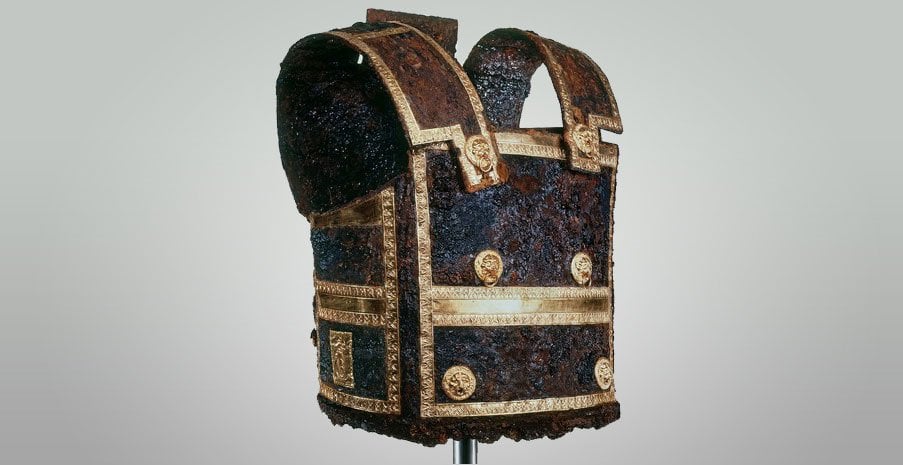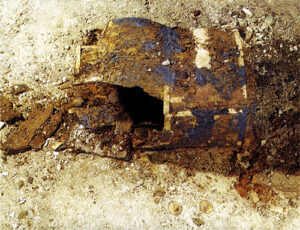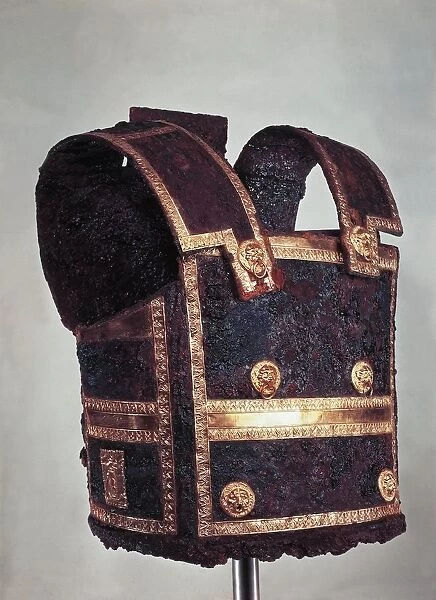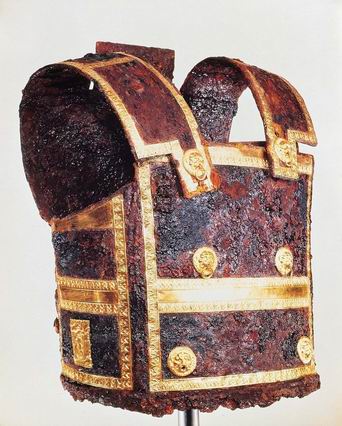The Legacy of Philip II
Before the illustrious reign of Alexander the Great, his father, Philip II of Macedonia, was a formidable ruler and one of the ancient world’s most accomplished generals. His military and political acumen laid the foundation for the vast empire that Alexander would later expand. A testament to Philip II’s power and legacy is the iron and gold cuirass, a piece of armor that symbolizes the strength and sophistication of his reign.

The Cuirass: A Symbol of Power and Prestige
The iron and gold cuirass of Philip II dates back to the 4th century BC and is a remarkable artifact from ancient Macedonia. This exquisite piece of armor not only served a practical purpose in battle but also represented the wealth and status of the Macedonian king. Crafted with iron for strength and adorned with gold for splendor, the cuirass exemplifies the dual aspects of Philip’s rule: military prowess and regal grandeur.
The Craftsmanship of Ancient Armor
The cuirass, a type of breastplate, was designed to protect the wearer’s torso during combat. The iron provided the necessary durability and resilience against weapons, while the gold embellishments highlighted the king’s royal stature and the sophisticated craftsmanship of Macedonian artisans. This combination of materials reflects the advanced metallurgical skills of the period and the importance placed on both function and form in royal armor.
Philip II: The Architect of Macedonian Power

Philip II’s reign (359-336 BC) was marked by significant military reforms and strategic conquests that transformed Macedonia into a dominant power in the ancient world. He reorganized the army, introducing the phalanx formation, which became a crucial element in Macedonian military success. His diplomatic and military strategies also expanded Macedonian territory and influence, setting the stage for Alexander’s future conquests.
The Influence on Alexander the Great
The iron and gold cuirass not only symbolizes Philip II’s achievements but also serves as a reminder of the legacy he passed on to his son, Alexander the Great. Philip’s innovations in military tactics, his consolidation of power, and his vision of a unified Greece under Macedonian rule were instrumental in shaping Alexander’s approach to leadership and conquest. The young Alexander inherited not only his father’s kingdom but also his ambition and strategic genius.

Conclusion
The iron and gold cuirass of King Philip II of Macedon is more than just an ancient artifact; it is a symbol of a ruler whose impact on history was profound. Philip’s ability to blend military innovation with political strategy enabled him to forge a powerful state, paving the way for his son, Alexander the Great, to build one of the largest empires in history. This remarkable piece of armor stands as a testament to the enduring legacy of a king who was both a master general and a visionary leader.
